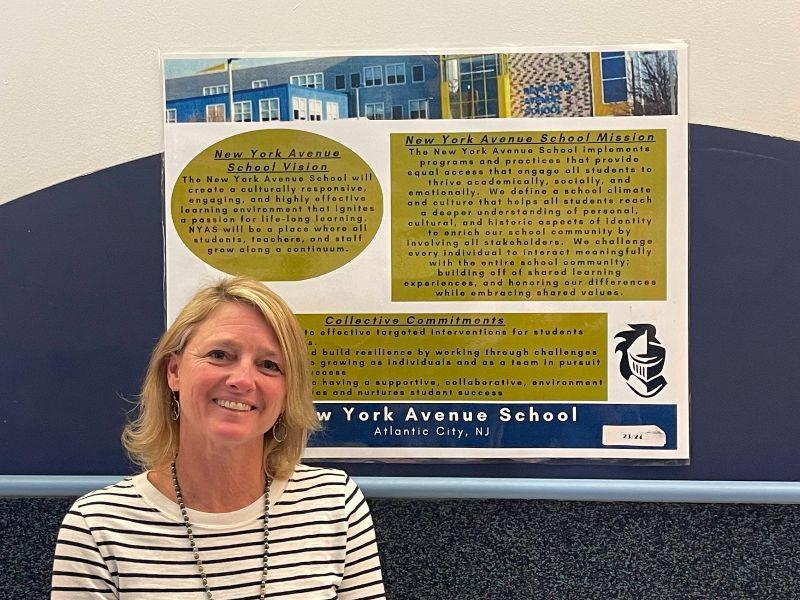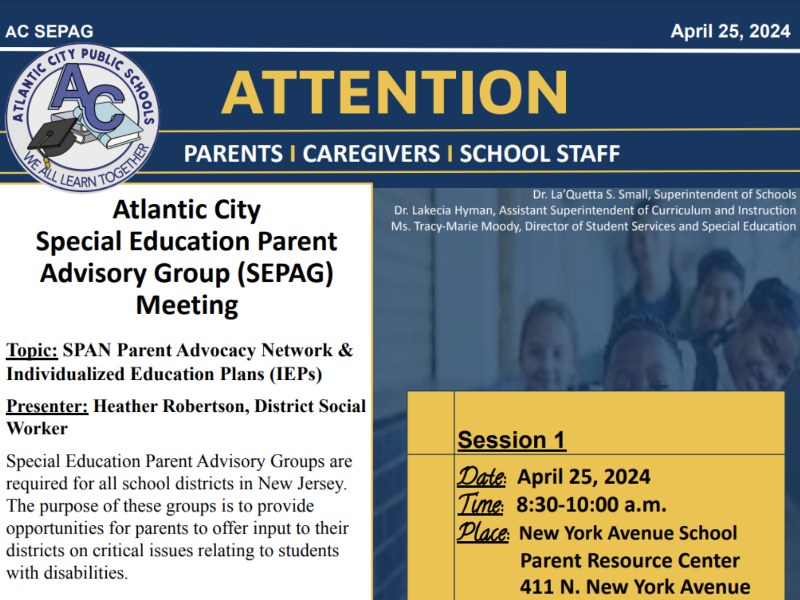The School Social Worker: The Bridge Between Home, School and Resources
April 23, 2024
ATLANTIC CITY — If a student needs services and their family doesn’t know where to turn, they will probably be referred to a school social worker who can help.
In the Atlantic City Public Schools, social workers facilitate testing for special education, help create student Individual Education Plans (IEP), and serve on child study teams, which also include psychologists and Learning Teacher Disability Consultants.
However, that’s not all they do. They interview families and connect people to various resources outside the school district.
“If you don’t know who to call, you call the social worker,” said Director of Special Services Tracy-Marie Moody. “If they can’t help, they know who can.”
District Social Worker Heather Robertson held two Atlantic City Special Education Advisory Group Meetings on Thursday, April 25, 2024, to give parents a chance to offer input on the district’s “critical issues relating to students with disabilities.”

District Social Worker Heather Robertson held meetings to encourage parental involvement relating to students with disabilities.
The first meeting was held from 8:30 a.m. to 10 a.m. at New York Avenue School. The second was held from 1:00 p.m. to 2:30 p.m. at Chelsea Heights School. Both also gave parents a chance for an introduction to various programs. However, the process works best when parents advocate for their children as well.
“We really want to increase parent participation and involvement,” said Robertson. “Our parents have no idea how much we need them in the process.”

EARLY ASSESSMENT LEADS TO BETTER OUTCOMES
Typically, needs are first identified by guidance counselors. Then, school social workers are called in to support the student, the family and teachers.

Preschool Social Worker Annalisea Johnson encourages good behavior through positive reinforcement.
“At an early preschool level, we work with behavior modification and behavior regulation as well as social and emotional support within the classroom,” said Preschool Social Worker Annalisea Johnson. “We also help make the home and school connection to provide the family with the same resources that we use, to help better support them at home.”
Social workers are trained professionals who provide a range of services such as counseling, crisis intervention, advocacy, referral, consultation, prevention, and education. They help students cope with academic, social, emotional, and behavioral challenges, and foster a positive school climate that supports learning and development.
Johnson said sometimes younger students need help making the transition from spending most of their time at home to navigating the school environment.
“We teach and model using positive reinforcement,” Johnson said. “Positive behavior that we like to see would be empathy. Behavior that is undesirable is violence.”
Still, school social workers try hard not to let children become stigmatized.
“We want to move away from language like ‘that bad kid’ or ‘that problem kid,’” Johnson said.
DEVELOPING A STUDENT SUCCESS PATH
Robertson said that if a student has developmental challenges rather than just behavioral issues, a student can be brought into the special education program as early as three years old. A preschool IEP can be developed and when they turn five years old, they receive a school-age classification.
“Early childhood is such a beneficial opportunity for students because you’re able to help them get the necessary skills early on versus in kindergarten or first grade,” Johnson said.
Sometimes, students act out because they don’t understand what’s required.
“Every behavior is a form of communication,” Johnson said. “With that mindset, we try to figure out what they’re trying to communicate.”
In general, school social workers are committed to the principles of social justice, human rights, diversity, and to the ethical standards of the social work profession.
THE ORIGIN OF SCHOOL SOCIAL WORKERS
According to Dr. Dee Stalnecker, the history of school social workers in the United States, can be traced back to the early 20th century when the concept of integrating social work practices into the educational system began to take shape.
First called “visiting teachers,” these school social workers of sorts, helped make the connection between home and school.
In 1905, teacher Mary Marot is credited with the idea of school-home visiting. She observed programs in Chicago and New York before later working at the Lighthouse Settlement in Philadelphia.
Meanwhile, the work was quickly advancing in Chicago. By 1906, Jane Addams had become the first recognized school social worker based on her involvement with the Hull House settlement in the Windy City. There, she focused on addressing the social conditions affecting immigrant families and their children's ability to succeed in school. This pioneering effort highlighted the impact of social and environmental factors on children’s educational outcomes, paving the way for the formalization of the school social work profession. By the 1910s, several cities across the U.S. had begun to employ social workers within their school systems to link home, school, and community to address the broader social issues that impeded student learning.
The profession continued to evolve throughout the 20th century, becoming more structured with the establishment of the first Midwest School Social Work Conference in 1968. Attendees from all over the region, including consultants and school social workers, met in Illinois. Some 600 people attended and another 200 were turned away because the conference had reached capacity. Various social work organizations sprang up in different parts of the country that included School Social Workers. However, in 1994, 64 people from 20 states came together to form an organization exclusively representing School Social Workers, the School Social Work Association of America.
The organization was pivotal in defining the roles and practices of school social workers, promoting standards, and fostering professional development. Over the decades, the role of school social workers has expanded from primarily addressing poverty and truancy to encompassing more comprehensive services, including mental health support, crisis intervention, and advocacy for special education.
The School Social Work Association of America (SSWAA) stands as the premiere national membership organization singularly dedicated to School Social Work practice, according to a prepared statement from the SSWAA. Known as the authoritative voice in the field, SSWAA plays a pivotal role in advancing the profession and empowering school social workers across the nation. SSWAA is also committed to providing comprehensive professional development training, equipping practitioners with best practice tools, and offering a wealth of relevant resources. By delivering these essential services, the association fulfills its mission — to enhance the social and emotional growth and academic outcomes of all students both nationally and globally.
NATIONAL SCHOOL SOCIAL WORKER WEEK
National School Social Worker Week was held last month from March 3rd to March 9th, 2024.
National School Social Worker Week is an annual event that recognizes the contributions of school social workers to the well-being and success of students, families, and schools. It is celebrated in the first full week of March every year, coinciding with National Social Work Month.
“In the tapestry of education, school social workers are the threads of compassion, weaving empathy, support, and understanding into the fabric of students' lives,” said Dr. Terriyln Rivers-Cannon, Board President for the School Social Work Association of America. “National School Social Work Week is a canvas to celebrate their profound impact, a masterpiece of care, advocacy, and transformative influence."
At the core, said Moody, social workers are connectors.
“The social worker helps navigate getting the student more resources,” Moody said. If you need help for your child, reach out to the Atlantic City Public Schools Student Services Department at (609) 343-7200 (x) 5153.
The following is a list of social workers and their contact information:
Monyah McQueen-Brown
Pennsylvania Avenue School
Uptown School Complex
Brandi Sheridan
Brighton Avenue School
Chelsea Heights School
Richmond Avenue School
Sovereign Avenue School
Betsy Nieves
Dr. Martin Luther King Jr. School Complex
New York Avenue School
Texas Avenue School
Theda Allen
Atlantic City High School
Andrea Vreeland
Atlantic City High School
Tara Thomas-Lake
Atlantic City High School
Heather Robertson
District-wide
Gabrielle Miller
District-wide
Annelisea Johnson
Preschool District-wide

